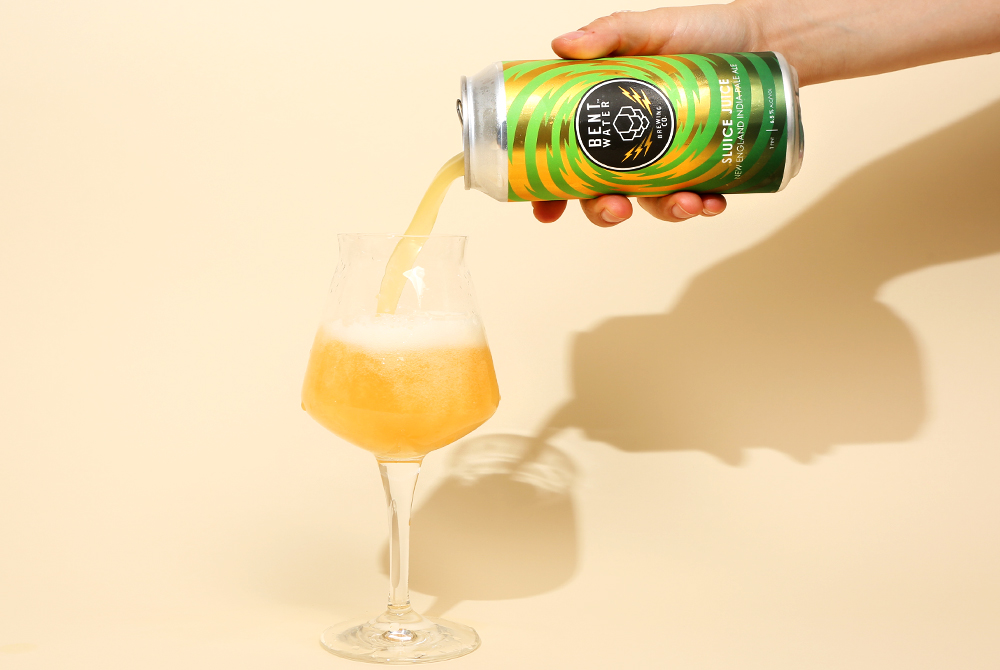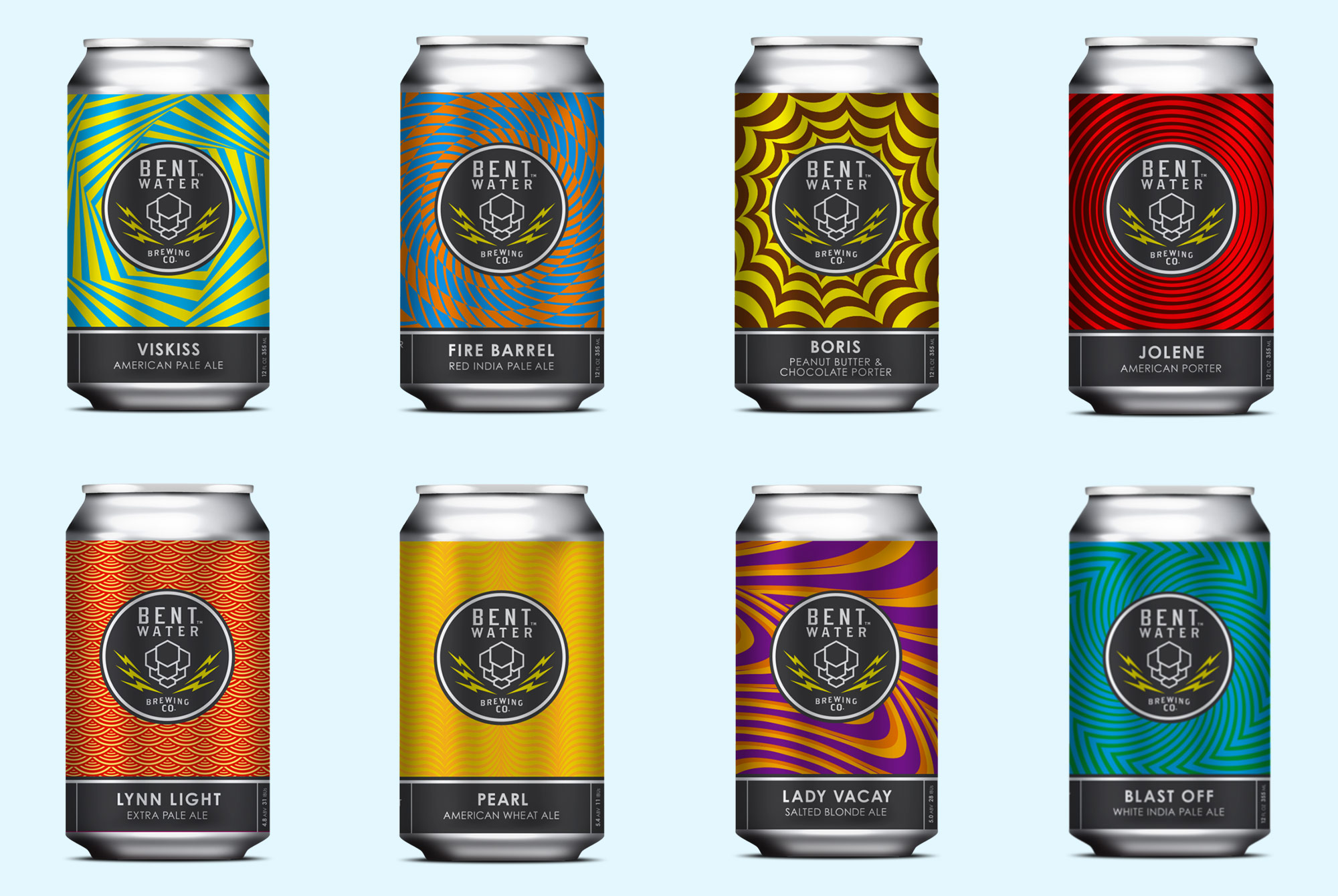Shop
Bent Water Brewing Co. Shares How To Make Consistent Beer
It's in the water.
At Hop Culture, we often talk about the magic of the brewing process. Spontaneous and wild fermentation is like alchemy, a nearly-inexplicable phenomenon that results in something beautiful and special. But it’s something that Bent Water Brewing Co.’s owner and president Aaron Reames knows all about.
As someone who works in molecular genetics and biotechnology, Reames takes the science and consistency of beer seriously. Whereas most young breweries focus on selling rotating limited releases to customers lining up around the block, Bent Water Brewing took a different approach, making consistency part of its foundation.
“I was blessed to have a really poignant conversation with the team at Ballast Point in 2013 or 2014,” says Reames. “What they said is, ‘You have to determine if you want to make money out the front door or the back door. And if your liquid is good, and it has to be good to really grow scale, you just need to compete on your liquid.’ So we didn’t have a taproom-oriented model. We found a location that worked well for distribution, for overhead, and for manufacturing–things of that sort.”
Instead of investing hundreds of thousands of dollars in a downtown Boston taproom and trying to chase the latest trends, Reames forged his own path, opening a brewery focused on consistency over hype. In 2016, he opened Bent Water Brewing Co. in the manufacturing town of Lynn, Massachusetts.
Where Did Bent Water Brewing Co. Start?
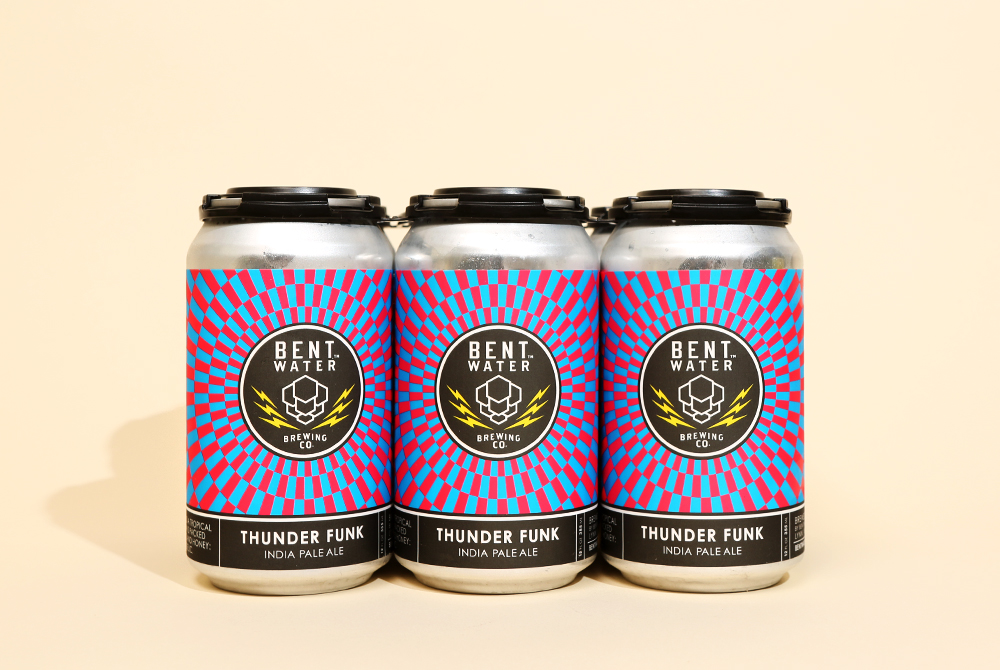
Like Apple, Google, and Microsoft, Bent Water began in a garage. Reames began homebrewing after a conversation with Bill Cherry from Switchback Brewing Company at a fraternity anniversary event.
“Something clicked that night, talking with Bill,” shares Reames. “The more I studied beer, the more I realized I didn’t know that much.”
Shortly after that conversation with Cherry, Reames began homebrewing in his garage, developing the recipes for what would later become Bent Water core beers like Thunder Funk and Jolene. He quickly took his hobby to another level.
“It was a homebrew system at a different scale,” says Reames. “I had a three-and-a-half barrel glycol-jacketed fermenter. I wanted to make sure I was running at a small scale but could ultimately work out some of the variables at scale before going in and launching with a fifteen barrel system.”
By 2016, Reames and a few friends had built that larger brewery. A few short years later, Reames has a team of 20+ employees and a consistent product that is distributed in Massachusetts, New Hampshire, Florida, and soon Rhode Island.
Where Does The Name Bent Water Come From?
When naming his brewery, Reames took his passion for science to heart.
“From a chemistry standpoint, water is bent at 104.5°,” shares Reames. “It’s a universal solvent and it’s the main ingredient in beer.”
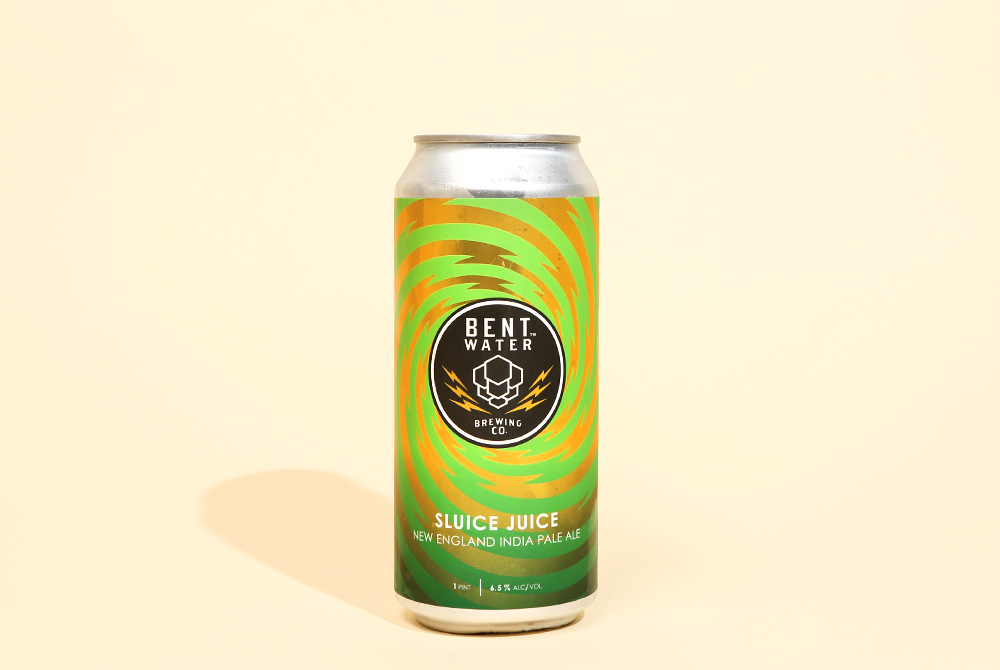
As any brewer knows, water is also the least sexy ingredient in beer. But it can have a significant impact on the final product. And, according to Reames, Lynn has top-quality water — another good reason for choosing Lynn as the site for his brewery.
“If you take a look at our logo, you’ll see a molecular hop,” Reames says. “The electricity is a play to Tesla and that being needed to drive the operation. This idea to play to the science background and water can mean so many things to so many different people and can come in so many different forms. So for us it’s a name that was going to resonate in a lot of different ways.”
Consistency At Bent Water Brewing Co.
The key word when talking about Bent Water Brewing Co. is consistency.
“We’re getting to a point where our regular beers are consistent,” shares Head Brewer and Director of Quality Adam Denny Golab. “Our beers always taste the way they should. And I think that’s a challenge for a smaller craft brewery to replicate their beers over and over again.”
Part of that challenge can be the fear of “sameness.” There’s a vocal section of the craft beer fanbase that craves variety and chases the next new thing. Plus, there are many brewers who want some variability in their profession, that want to keep the job interesting with new and creative beers.
But brewers at Bent Water Brewing Co. get to have the best of both worlds.
“There’s an aspect of this job where — from a brewer’s standpoint — they want to express their creativity,” says Bent Water’s Quality Manager Brian Ferrazzani. “At the same time, the market decides what we’re brewing — we’re brewing our core brands on a regular basis because that’s what demand needs. But when the brewers can try something on the small-batch system is when they’re really being innovative. I think we do a good job of striking that balance.”
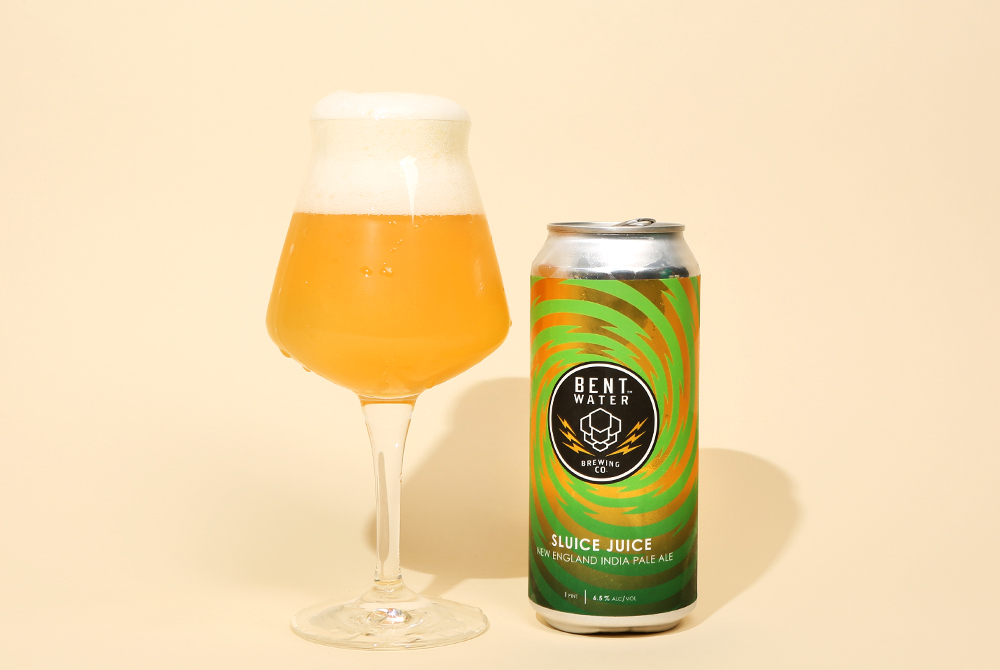
As the Head Brewer, Denny Golab is tasked with ensuring consistency. But, he also has room to experiment.
“Technical brewing in itself, I have enjoyment in that,” says Denny Golab. “Finding the root cause of why something changed in the process and being able to fix it and then seeing that in the finished product. That’s really cool for me. If you’re someone who has to brew the same beer day in and day out, I can see how that might get boring. But I get to do that investigative side of things and I find that challenging and rewarding in itself.”
Bent Water and the Science of Consistency
Beer can be fickle. When seeking consistency, a sanitary brewhouse and strict adherence to the same recipe are only part of the equation.
“The process of making beer in itself is simple,” says Ferrazzani. “To make it on a production scale is increasingly more difficult. And to make the same beer over and over again is increasingly more difficult from there.”
Investing in proper equipment, maintaining control over packaging, and setting up quality control systems all contribute to better, more consistent beer.
There’s a definite cost associated with building these systems. That’s why the macro breweries like Anheuser Busch tend to have the best labs in the industry. But, they also make a consistent product every single time.
“There’s a lot of shade thrown at these big macro breweries but they make a consistent product,” explains Ferrazzani. “They’re really good at what they do.”
Reames wanted to merge that focus on consistency at the macro level with the desire for innovation at a smaller craft brewery.
“His original trade was in the sciences,” Ferrazzani says of Reames. “And even as a homebrewer, his focus was on quality and consistency and the science of brewing. So I really think him being the owner and him setting that precedent early has shaped our company and transferred into our growth.”
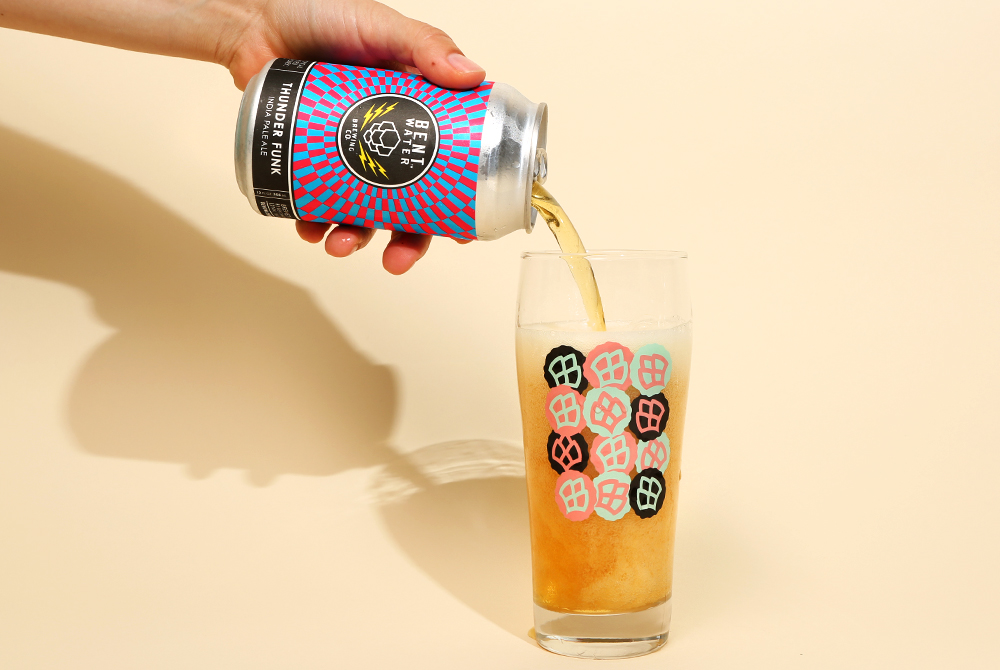
How To Consistently Make Good Beer
Want to make better beer? Focus on fermentation.
“A lot of breweries use a microscope and a hemocytometer to count cells manually,” says Ferrazzani. “But we invested in an automated cell counter that takes a lot of the human subjectivity out of it. It gives us more accurate numbers, which has been a huge part of maintaining consistent fermentations.”
With the automated cell counter, Bent Water replicates their yeast pitches in every batch of beer.
Moreover, once the beer is brewed, Ferrazzani stresses the importance of proper packaging. As poorly managed canning lines can lead to compromised beer, Reames purchased a canning line to ensure that Bent Water had complete control over its packaging.
“Dissolved oxygen severely degrades beer pretty rapidly and can seriously inhibit shelf life and contribute to off-flavors,” says Ferrazzani. “We’ve become pretty meticulous about monitoring dissolved oxygen throughout our packaging process.”
Over the last several years, Reames has invested in several innovations to improve the quality of their product. They worked with Mettler Toledo, a laboratory tool manufacturer, to create a novel way to purge their tanks of oxygen. They also installed concrete tanks to mimic the fermentation of some West Coast wines.
The bottom line is that Bent Water continues to improve its product.
“In the beer industry, you can take quality as far as you’re willing to go,” says Ferrazzani. “You could make continuous improvements forever.”
Does the average consumer care about the latest updates in the science of craft beer?
“Probably not,” admits Reames. “But do they understand how an iPhone really works? No. However, they know Apple is a reliable producer. At the end of the day, that’s what they really care about — their personal experience.”
Bent Water Brewing Co. Makes Under-the-Radar Beer
“We’re not coming out with the newest, most exotic things,” says Reames. “Others do that better. But, when you’re thinking about the process, that’s where we continually make strides.”
For Bent Water, quality is measurable and ultimately plays out in the final product.
“A great beer is true to style,” says Ferrazzani. “It’s free from off-flavors and imperfections and delivers on its promises.”
By those measures, Bent Water succeeds.
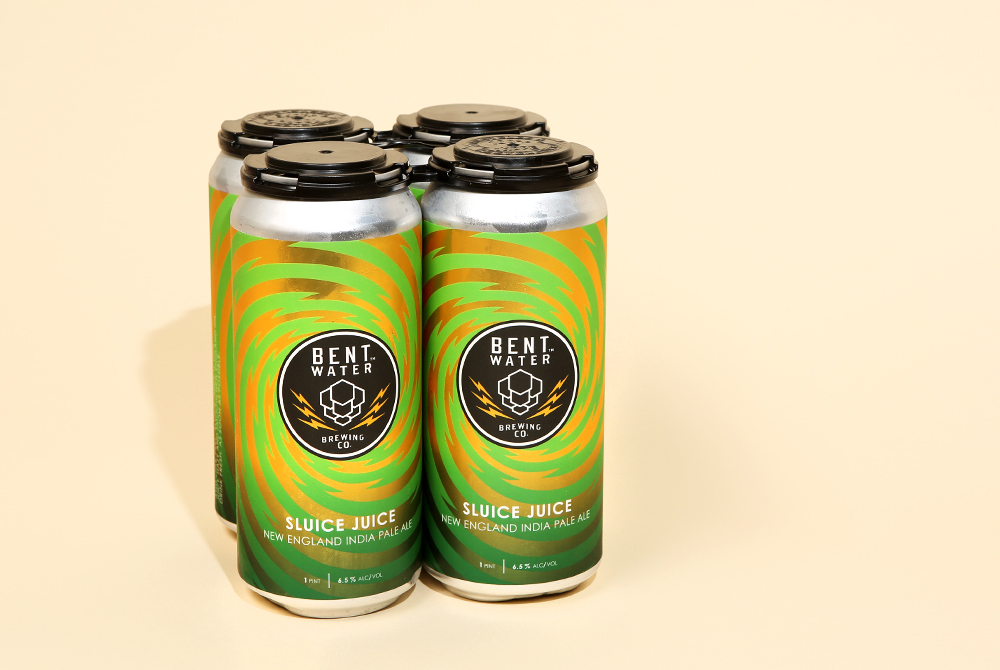
Thunder Funk is a straightforward American IPA. It has the requisite balance of bitterness and fruit. There’s a bit of opaque haze, but not enough to fall into the New England IPA territory.
All the way toward the hazy side of the spectrum is Sluice Juice, a New England IPA through and through. It has bright, vibrant citrus flavors and aromatics and a smooth, full finish.
Because they haven’t had lines out the door for one-off can releases, it’s likely that Bent Water has flown under the radar for quite some time. But that’s changing. And, that’s owed to the consistent quality of the beer.
“I think I had a perception of what their beer tasted like,” says Sarah Barbuti, who goes by @thatcraftbeerbitch on Instagram. “But I was blown away. Sluice Juice has become a go-to for me. It’s the type of beer that makes me want to go visit the brewery. And every time I get it, I’m blown away by it. It isn’t any different than the first time I got it.”
The Bottom Line on Bent Water Brewing Co.
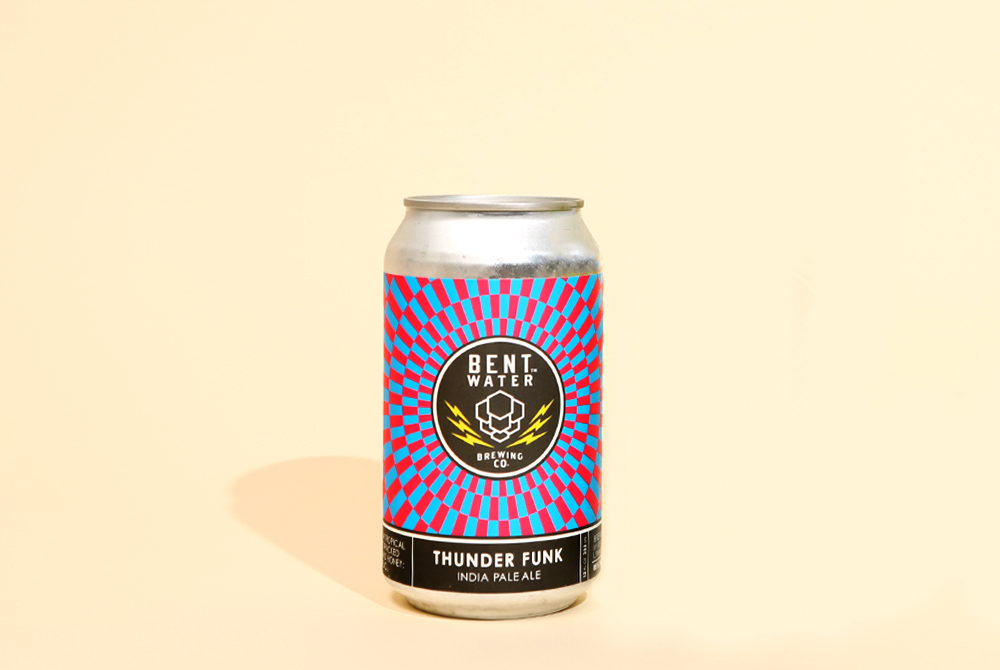
As COVID-19 continues to decimate taproom sales, Bent Water Brewing Co. has the opportunity to become a household name. Instead of focusing on hyperlocal releases and exclusive offerings, they’ve distributed to retail markets in Massachusetts, New Hampshire, and Florida with Rhode Island on the way.
“We started by staying in a twenty-five-mile radius from the brewery and then expanded that to about forty miles,” says Reames. “It was very thoughtful, very much learning from New Glarus and others about owning your backyard.”
Sending beer any further has the potential to impact quality. Once you send beer to a restaurant or bottle shop or bar in a neighboring state, you give them control over the integrity of the product.
Reproducibility and consistency are critical. Every time a consumer opens a can from Bent Water Brewing Co., they want it to taste like the last one.
“I remind the team every day to keep it simple,” explains Reames. “You don’t have to measure everything — just what’s important.”
This is a paid, sponsored post presented by Bent Water Brewing Co.
Liked this article? Sign up for our newsletter to get the best craft beer writing on the web delivered straight to your inbox.

